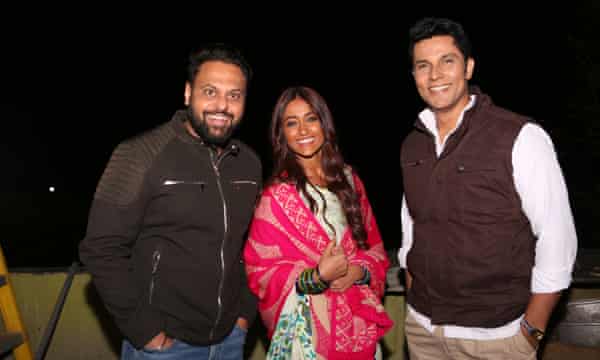
Photo The Guardian
Unfair & Lovely: The Bollywood Film Shining a Light on Dark-Skin Discrimination
By Amrit Dhillon
Three months ago, a high court judge in Chhattisgarh, India, hearing a divorce petition by a husband whose wife said he humiliated her for her dark skin, said it was time Indian society changed its “ dialogue at home ” to eradicate prejudice.
As if on cue, a new social comedy, Tera Kya Hoga Lovely (Unfair & Lovely), tackles precisely this issue in the hope of nudging Indians into examining the common longstanding preference for light skin.
Directed by Balwinder Singh Janjua, it depicts a woman called Lovely, played by Ileana D’Cruz, who is unable to get married because of her dark skin.
Prospective grooms and their families turn up at her home to inspect the bride. On seeing her, they beat a hasty retreat. One family condescends to considering a marriage but demands double the dowry as “compensation”.
In despair, she laments to her father that he educated her so that she could forge her own destiny but society judges her purely on her skin color. The father responds with sadness: “My dear, your complexion overshadowed your destiny.”
Though an affectionate father, it is the wrong reply, illustrating, says Janjua, how guilty Indian families can be of perpetuating attitudes. He says society discriminates against dark-skinned people in the film industry, in jobs, in promotions, in modelling and advertising.
But if the discrimination comes from within the family – such as when parents unthinkingly call a dark-skinned child by disparaging nicknames – the damage is even greater. Meant to be a haven of unconditional love, the family becomes a site of betrayal.
The trailer for Unfair & Lovely
“My point is that if society discriminates against a dark-skinned person, at least their family shouldn’t do it,” says Janjua. “Those first few formative years are crucial and that’s when many Indian families get it wrong by constantly singling out a child’s skin color.”
That is why, he says, the father’s response in his film is badly misguided. “How can it help her self-confidence if he says her skin color is her destiny? Everyone in the audience will recognize the way the girl is treated, it’s so common.”
This prejudice is deep-rooted in India, deriving principally from the caste system. Dark skin is associated with being in a lower caste, and so from a disadvantaged group. When Bollywood casting directors are looking for someone to play a character from a poor background, they inevitably look for someone dark.
With a few exceptions, such as the star actor Nawazuddin Siddiqui, the film industry rarely casts a dark-skinned person in a lead role.
“Art is mixed with commerce and the feeling is that audiences won’t accept a dark-skinned lead and the film will flop,” says Janjua.
The actor and former Miss World Priyanka Chopra, now based in the US, said last year that Bollywood’s obsession with fair skin was one of the reasons she left the industry to try her luck in Hollywood nine years ago. Her skin had been lightened in many movies, through makeup and lighting, she said.
Another actor, Bipasha Basu, also says she was advised early in her career to undergo skin-lightening treatment.
Ranjana Kumari, the director of the Centre for Social Research, cites the weight of many factors – the caste system, British colonial rule “which gave Indians an inferiority complex and colonized our minds” and even fair-skinned images of Hindu goddesses.
But she is pleased with some small victories. In 2020, her center and other groups lobbied Unilever to remove the word “fair” from the name of its skin-lightening cream, Fair & Lovely, which she says pandered to Indians’ insecurity. “Why are you giving society such a wrong message?” was Kumari’s challenge.
The company changed the name to Glow & Lovely. She says it may be only a renaming, but it’s “something”.
Enjoying a coffee with her friends in Delhi’s Khan Market, fashion student Nita Aggarwal, 27, says attitudes are shifting, albeit slowly. “Young women like me are more interested in healthy skin and a radiant look, not the color. We’re a minority still but I think attitudes are changing in small pockets,” she says.
In classic Bollywood-happy-ending style, Lovely eventually finds love and acceptance. Janjua calls himself an optimist.
“I had to get the message across with a light touch,” he says. “Sermonizing doesn’t work so I wanted to try humor – humor to make families think about what they do every day to destroy a dark child’s confidence.”
Or as in the case of the husband in Chhattisgarh, about how such insults might affect his wife. - The Guardian

